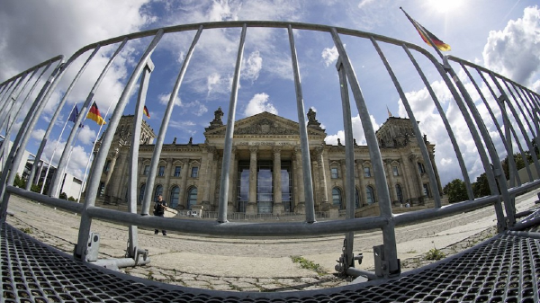We must not allow COVID-19 to divide us
Cornelia Meyer | 03 September 2020
cv78
This year will go down in the history books as one that saw a deadly pandemic grip the planet. It will also be remembered for demonstrations often getting violent. On the one hand, many people disagreed with the strict rules brought in as a result of the pandemic, so they took to the streets to voice their concerns. On the other, we saw Black Lives Matter and human rights protests occurring all over the globe.
In a New York Times op-ed in May, Paul Krugman correctly pointed out that the coronavirus disease (COVID-19) reality has a liberal bias, as does the understanding that humans are born equal and that discrimination, whether on race, gender or any other grounds, is wrong. The COVID-19 deniers question health experts’ warnings about the dangers the virus poses and their guidance regarding measures to stop its spread. When weighing up the public good of health versus economic damage due to lockdowns, the COVID-19 skeptics come down on the side of the economy. For them, freedom — such as their right not to wear face masks or to congregate — matters.
Thus, what has unfolded on the streets of our cities and towns is a bifurcation of “wokeness” versus right-wing anger. The virus has proved to be particularly divisive in an environment that was already becoming increasingly polarized.
The Black Lives Matter demonstrations made their way across the Atlantic. Many took to the streets of Europe in support of inclusivity in terms of race, gender and sexual orientation. They were outraged by George Floyd’s killing in Minneapolis. Talk shows and newspaper columns were devoted to Black Lives Matter and other causes. In the US, those demonstrations continued as several further assaults on black men followed. They have abated somewhat in Europe. However, we can see the same bifurcation of liberal versus right wing gaining speed.
In Europe, the anti-COVID-19 demonstrations are composed of a hotchpotch of pro-business, right-wing groups, citizens who advocate for their personal freedom, generally off-the-chart freedom-seeking individuals, and alt-right or fascist movements. They are banding together in a curious mix. Krugman’s assessment that the COVID-19 truth has a liberal bias holds true in Europe too. The anti-COVID-19 movement is to the right and far right, with even fascist elements at times.
What really matters is how to bring people together and not allow extremists to hijack the political discourse in the streets.
-Cornelia Meyer
For example, the leader of France’s National Rally, Marine Le Pen, accused the government of lying about COVID-19, questioned the usefulness of face masks and, of course, advocated for stronger border controls and agitated against free trade. She denounced the “ultra-liberal ideology” of France’s elites and its government. Far-right politicians in other European countries took a similar tone. Alternative for Germany and its far-right Wing faction were particularly vociferous.
Because of Germany’s history, the scenes that unfolded in Berlin on Saturday, when anti-COVID-19 demonstrators nearly stormed the Bundestag, were somewhat of a magnifying glass on the divisions emerging in societies across the continent. There was a fair showing of imperial flags and other insignia denoting sympathies to the Nazi philosophy. Many of the demonstrators were what Germans call “Wutbuerger” — very, if not dangerously, angry citizens. Historian Paul Nolte is of the opinion that extremist undercurrents have always been part of the German middle classes. The Nazis came to power aided by a right-wing bourgeoisie: An element that was still noticeable throughout the 1950s and early 1960s. In the 1970s and 1980s, the pendulum swung to left-wing liberalism, but it has since returned to the right, particularly after the inflow of a million refugees in 2015.
After last year’s assassination of Hesse politician Ernst Lubke and the right-wing terror attack on a synagogue in Halle, Interior Minister Horst Seehofer warned that the biggest danger to Germany’s internal security came from the far right. What unfolded on Saturday was testament to this statement. Had it not been for the heroic efforts of a few policemen, the Bundestag would have been stormed by a band of demonstrators with right-wing insignia reminding us of the Third Reich.
Democracy was once hard to come by in Germany and it means a lot to the majority of Germans. The Wutbuerger who wanted to storm the Bundestag struck a nerve regarding what Germany stands for and denoted a vulnerability. The debate on exclusion zones around the parliament building is secondary. What really matters is how to bring people together and not allow extremists to hijack the political discourse in the streets.
The coronavirus has brought out the best in many of us and given us a new-found appreciation of everyday heroes like nurses, bus drivers, policemen and workers who stock supermarket shelves. They kept us all going amid the public health crisis and during lockdown. At the same time, it has brought out the worst in us, laying bare people’s anger and propensity for violence.
We need to take care of our societies and not allow a tiny virus to broaden the rifts that already existed before COVID-19 struck. This holds equally true in Europe and the US. These countries are democracies, and democracies have to be lived on a daily basis. They require tolerance and a respect for people who think differently. We must not let extremists capitalize on what is already a difficult situation, as that would make things much worse. Unity, not division, has to be the name of the game — as it says in Germany’s national anthem: “Unity, justice and freedom… Towards these let us all strive.”
Cornelia Meyer is a Ph.D.-level economist with 30 years of experience in investment banking and industry.
This article was originally published on Arab News.
Views in this article are author’s own and do not necessarily reflect CGS policy.
